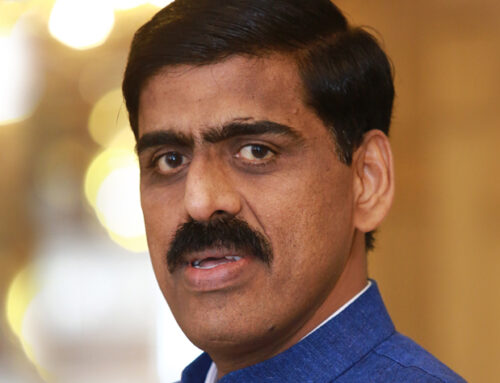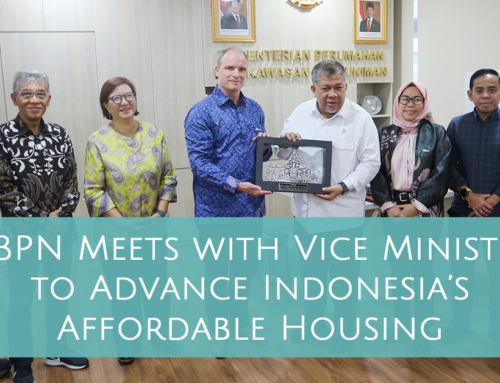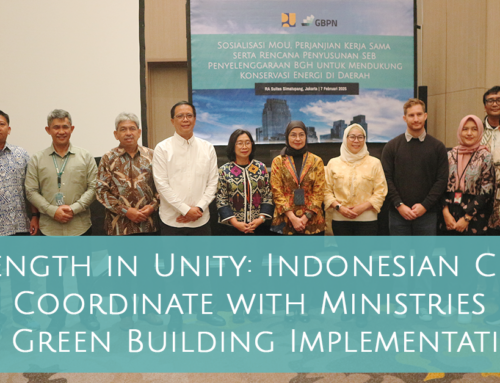GBPN’s unique approach to local policy implementation has received international recognition as a best practice approach. The United Nations Office for Project Services (UNOPS) referenced GBPN’s Indonesia-based coalition of experts – known as HIDUP – as a “noteworthy initiative”. UNOPS included HIDUP in public tender documentation, recognising it as a positive example of how to work effectively in Southeast Asia.
HIDUP Convenor and GBPN Technical and Special Project Lead in Indonesia, Matthieu Caille, said the initiative was intended to provide an engagement platform for stakeholders and experts.
“It is intended to be a ‘safe space’ for stakeholders and experts who are coming together to address specific questions and blockages in developing effective policy reform toward decarbonisation of the built environment,” he said.
“HIDUP is a Bahasa Indonesia word meaning ‘Alive’ and it is all about connecting local and global experts, and bridging unmet expertise on policy reform strategies, evidence base and education needs.
“HIDUP is a multilateral stakeholder engagement platform developed through a bottom-up approach. It helps us identify upcoming policy reform, associated studies, and capacity building or training and education program opportunities at national and sub-national level.”
Mr Caille said the strength of HIDUP was twofold.
“Firstly, this approach allows us to clearly understand local needs and challenges at pilot jurisdiction level. And secondly, we can combine these insights to derive evidence-based strategies from GBPN’s global resources and insights gained through over a decade of work in this space in more than 22 countries, adapted locally,” he said.
“By engaging the knowledge and insights of local experts, we can ensure that global learnings are fit-for-purpose within the local context in a nuanced way to make sure policies are both practical and implementable and achieve the greatest impact.”
HIDUP activity in 2022
In 2022, HIDUP will focus on supporting GBPN’s ongoing national and sub-national policy reform projects such as in Samarinda, Bali and the New Capital City Nusantara. It also aims to reduce energy demand and emission from the residential sector. HIDUP acts as an advisory group to the GBPN Policy Hub, a GBPN initiative that aims to provide a venue for Indonesian Government Ministries with an interest in sustainable building and energy policies to engage with GBPN and its projects.
An equivalent to the HIDUP model has been successfully rolled out in India under the name JINDA, which means ‘Alive’ in Hindi. JINDA is composed of a state-based alliance of five local experts who bring rich experience across a diverse range of focus areas.
GBPN’s Senior Advisor in India, Gautam Nagar, said the project was a pivotal initiative that would provide important learnings for the whole country. See more on JINDA here.
HIDUP Advisory Group Members

Dr. I Nyoman Satya Kumara
Pak Satya is a professor at the university of UDAYANA, one of the seven Center of Excellence Community Based Renewable Energy (CORE) in Indonesia. He has a strong knowledge on RE projects and has been developing a strong network of partners in Bali, including both public and private actors along the building supply chain.

Dimas Bintang Mudrajad
Pak Dimas is a representative of Ministry of PUPR in the province of East Kalimantan. He has been working closely with local Samarinda government to support the development of the Energy Efficiency Mayor Decree.

Assoc. Professor Poppy Ismalina
Ibu Poppy is a fiscal policy expert who has a long standing professional experience working with national governments (including Ministry of Finance, Financial Supervision Authority/OJK) and a vast network among academicians, public and private sector in the financial sector. Her expertise includes sustainable finance and green taxonomy.

Florentius Hendro Gunawan
Pak Hendro is one of the renewable energy champion inside the MEMR. He has been the locomotive who leads the engagements and innovations within the ministry. He is also the member of MASKEEI who actively support the MEMR for policy reform.

Yodi Danusastro
Pak Yodi has been known as green building champion in Indonesia. His works has received many awards and he is well known as GB expert to the Ministry of PUPR.

Deon Arinaldo
Deon is responsible for managing information and data systems. He has extensive experience involving in research activities related to the themes of energy, electricity, and climate change and economics in Indonesia. He holds a master’s degree from RMIT University Australia and a bachelor’s degree at the Bandung Institute of Technology.

Dr. Eka Permanasari
Ibu Eka is an Associate Professor in the field of urban design, architecture and Southeast Asian Studies in Monash University Indonesia.She has extensive experience in research and is a professional in the fields of architecture and urban design in Indonesia, Australia and Germany. She is also a professional urban designer who was involved in several strategic national projects. Throughout 2022, Ibu Eka is running the bi monthly series of “Urban Transformation Talks”, a collaboration between Monash University Indonesia and IAI’s Jakarta Chapter, focusing on issues relating to urban design and climate Change. She currently resides in Berlin, Germany.
Share This Story, Choose Your Platform!
Stay in touch with how we’re transforming the buildings sector
GBPN runs innovative building policy reform programs in key regions around the world that aim to tackle the climate emergency by decarbonising the buildings sector. Stay up to date with our newsletter.
Stay in touch with how we’re transforming the buildings sector
GBPN runs innovative building policy reform programs in key regions around the world that aim to tackle the climate emergency by decarbonising the buildings sector. Stay up to date with our newsletter.







